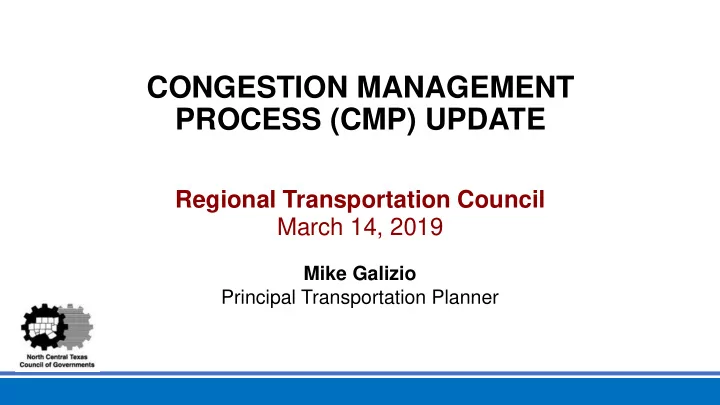

CONGESTION MANAGEMENT PROCESS (CMP) UPDATE Regional Transportation Council March 14, 2019 Mike Galizio Principal Transportation Planner
Federal Requirements A regionally-accepted approach for managing congestion that provides accurate, up-to-date information on transportation system performance and assesses alternative strategies for congestion management that meet state and local needs Mandated in any urbanized area with a population exceeding 200,000 (known as Transportation Management Areas) Federal regulations are not prescriptive regarding the methods and approaches that must be used to implement a CMP CMP References: 23 USC 134(k)(3) and 23 CFR 450.322 2
Federal Requirements Focuses on Congestion Management Strategies which should include: i. Demand management strategies; ii. Traffic operational improvements; iii. Public transportation improvements; iv. ITS technologies; and v. "Where necessary, additional system capacity" Requires a process to demonstrate that Single Occupant Vehicle (SOV) capacity projects in nonattainment areas are justified and comply with the CMP by integrating congestion management strategies The CMP shall be developed, established, and implemented as part of the Metropolitan Transportation Planning Process 3
CMP Processes and Related Documents PROCESSES DOCUMENTS 1. Develop Regional Objectives MTP Routes of NHS Significance 2. System Identification FFCS 3. Develop Performance Progress North Measures Texas 4. System Performance Monitoring & Evaluation Federal Performance Measures 5. Strategy Identification NEPA, Corridor & 6. Strategy Other Studies Selection 7. Project & Program Implementation and TIP Monitoring 8. Project Performance Evaluation
CMP History 1991 Congestion Management System (CMS) is required as part of the Intermodal Surface Transportation Efficiency Act 1994 First CMS was Adopted 2005 CMS was Amended through MTP Update 2007 CMS was Updated and Renamed Congestion Management Process (CMP) 2013 RTC Approved CMP Update 2019 Update Efforts are Underway
CMP Benefits ▪ Creates a Structured Process for Analyzing Congestion Issues ▪ Fosters an Objectives-Driven, Performance Based Approach ▪ Advocates for Increased Collaboration and Coordination ▪ Facilitates Strategy Selection and Project/Program Implementation ▪ Provides a Linkage to Project Development/Environmental Review 6
Key Questions for the Next CMP Update 1. Keep or update the CMP Goals and Objectives? 2. Expand or reduce the CMP Performance Measures? 3. Maintain or change the CMP Network? 4. Retain or revise the CMP Scoring Criteria? 5. Keep or replace the CMP Corridor Rankings? 6. Add or reduce the number of CMP Policies? 7. Expand or downsize the number of CMP Strategies? 8. Retain or replace the CMP Corridor Fact Sheets? 7
Roadway Corridors in 2013 CMP Update Highway Name DNT IH 20 IH 30 IH 35 IH 35E IH 35W IH 45 IH 635 IH 820 Loop 12 PGBT SH 114 SH 121 SH 161 SH 183 SH 360 SP 97 SP 366 SP 408 SP 482 US 67 US 75 US 80 US 175 US 287 8
CMP Update Schedule February 2019 STTC Overview Presentation March 2019 RTC Overview Presentation April-Aug 2019 Committee Outreach (STTC, RSAC, RFAC, PWC, BPAC) Aug-Sept 2019 30-Day Public Comment Period STTC Workshop and Public Meeting – Draft CMP August 2019 STTC (Info) – Scoring Criteria and Corridor Rankings September 2019 RTC Workshop – Draft CMP October 2019 STTC (Action) – Final CMP October 2019 RTC (Action) – Final CMP November 2019 9
Contacts Natalie Bettger, Senior Program Manager Communications and Transportation Solutions (817) 695-9280 / nbettger@nctcog.org Mike Galizio, Principal Transportation Planner Congestion and Asset Management (817) 608-2329 / mgalizio@nctcog.org Clifton Hall, Transportation Planner Congestion and Asset Management (817) 608-2384 / chall@nctcog.org www.nctcog.org/cmp
Recommend
More recommend